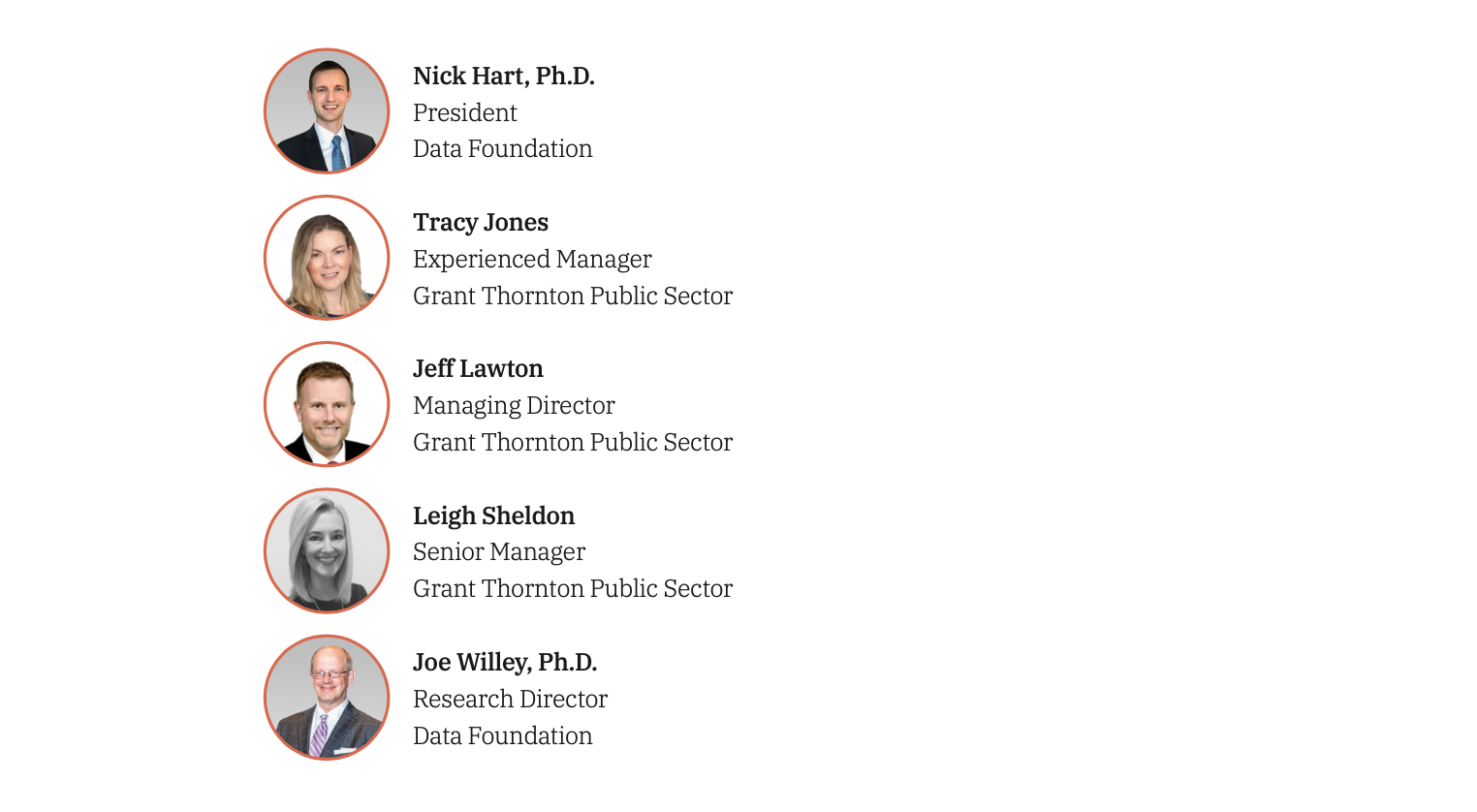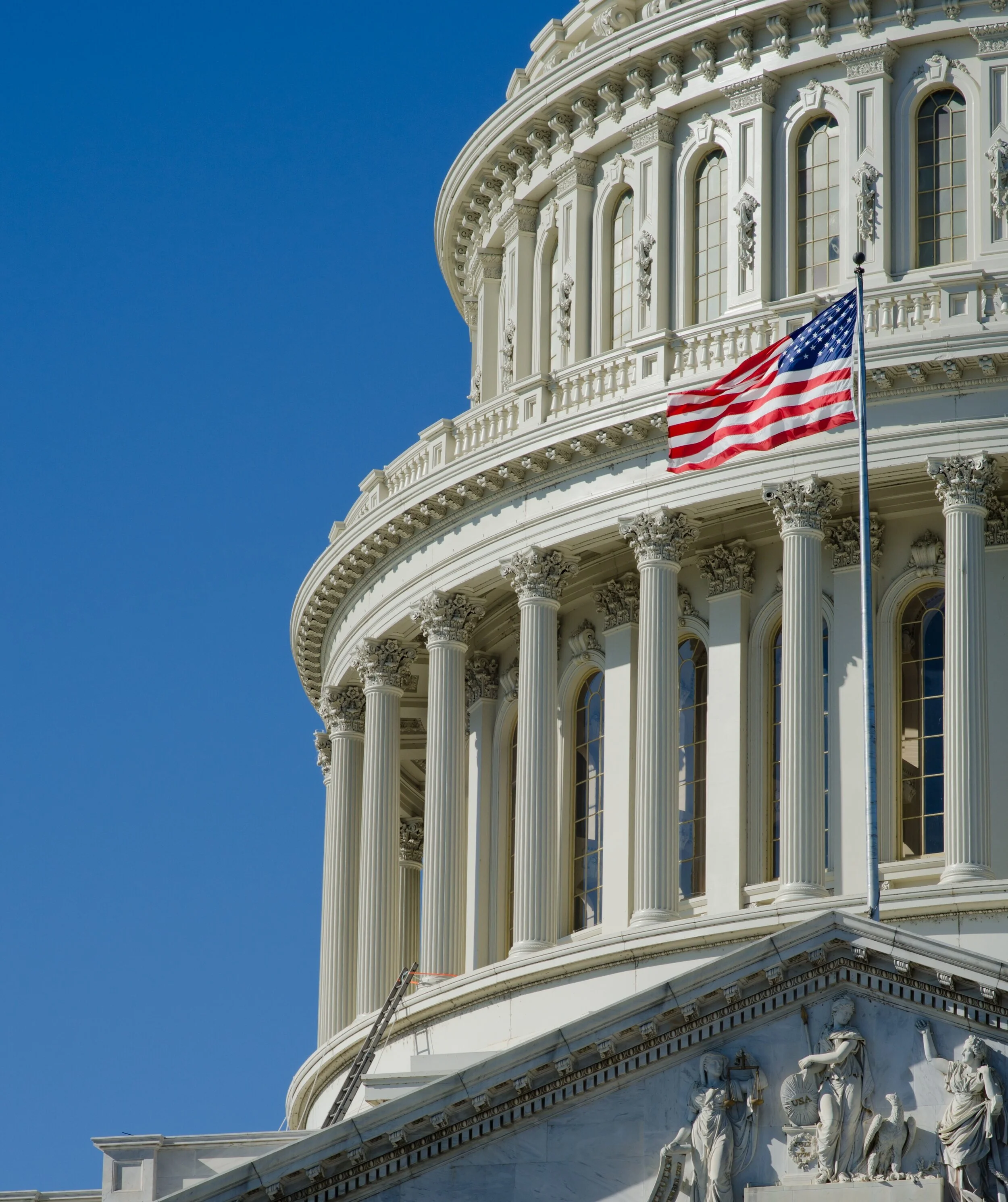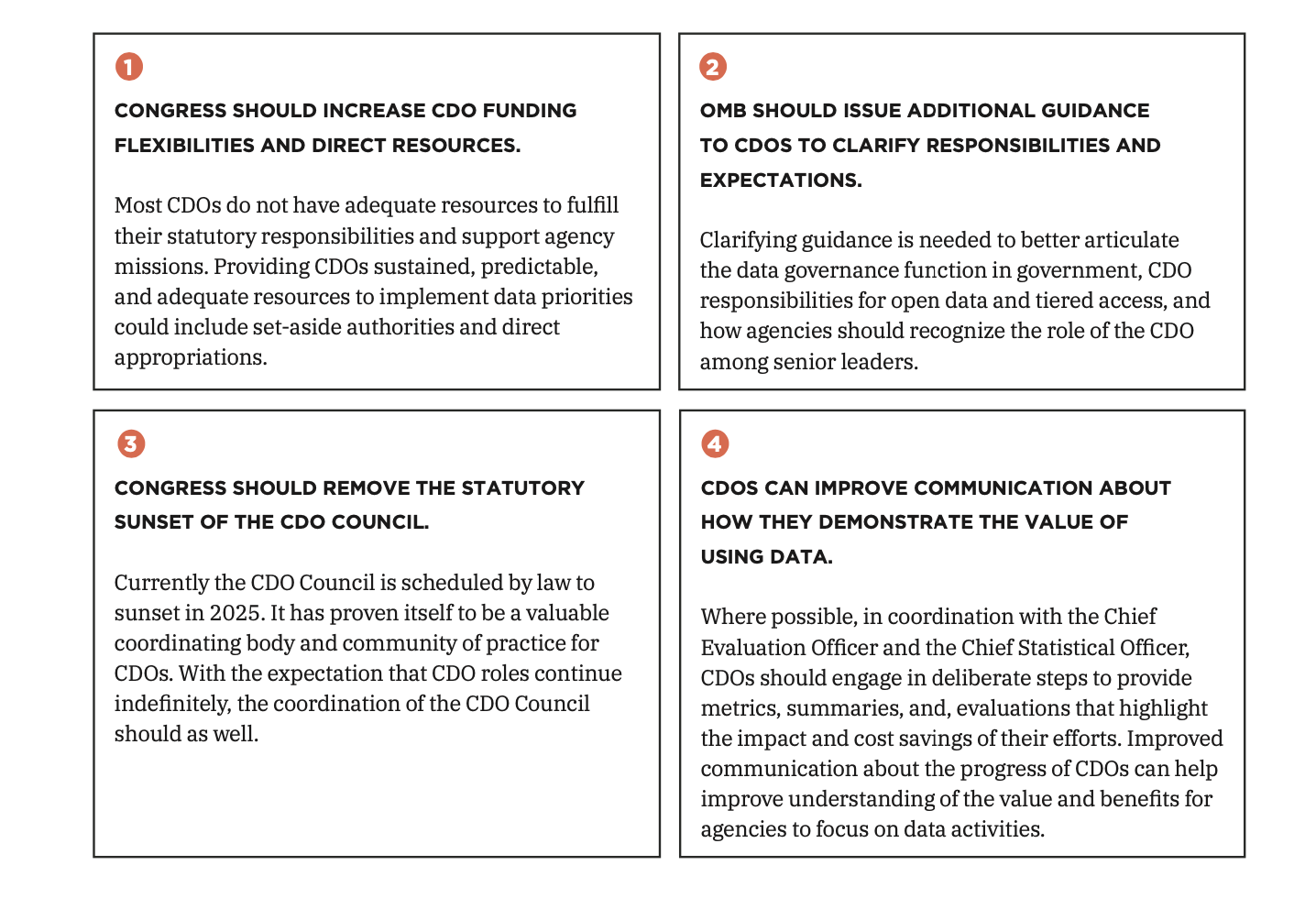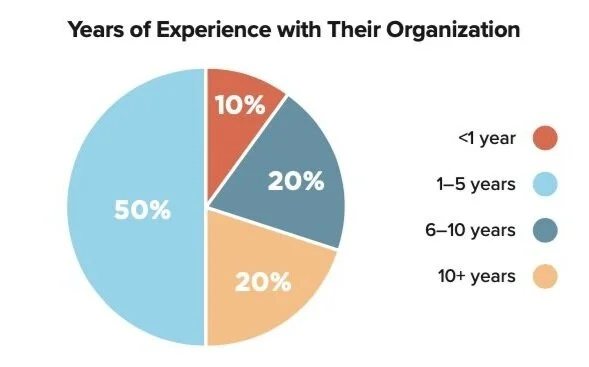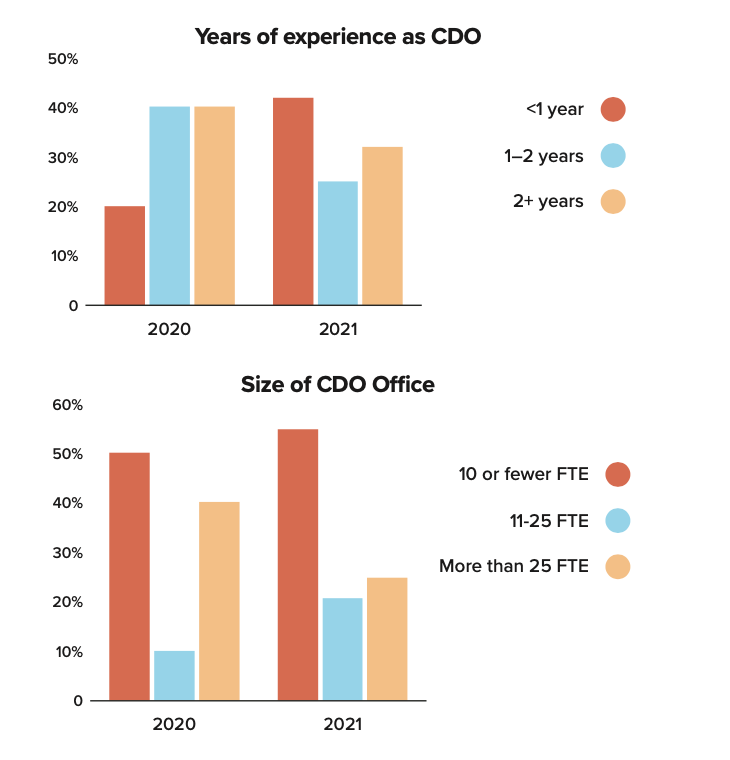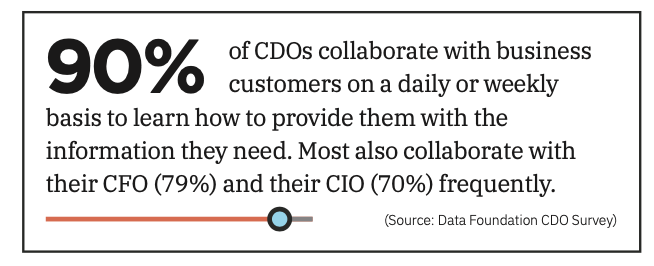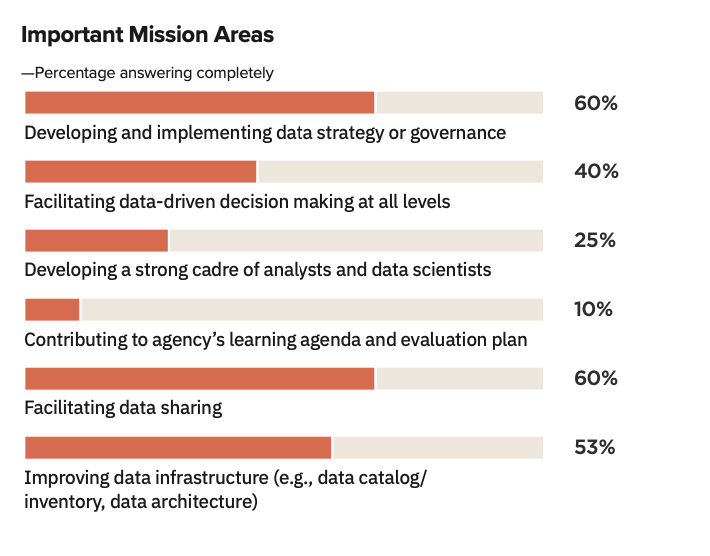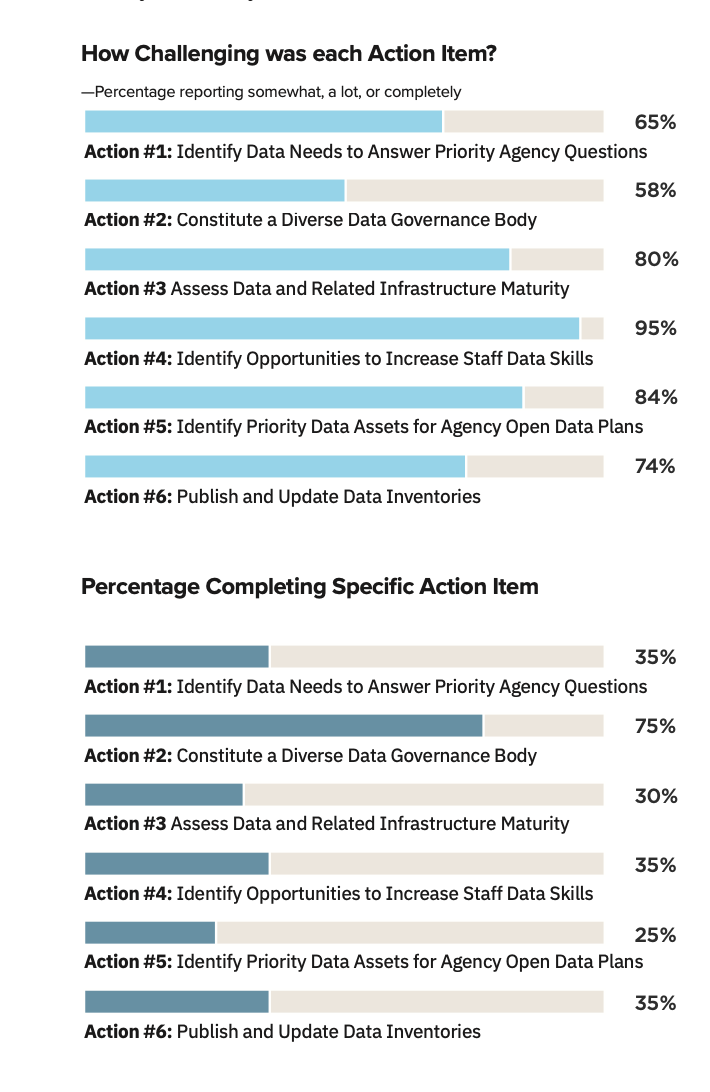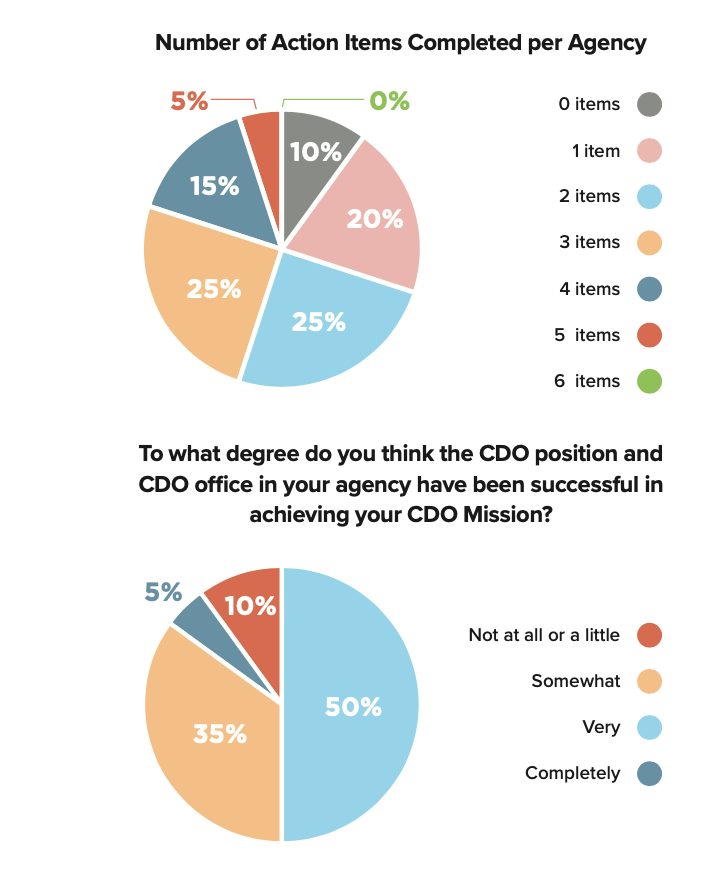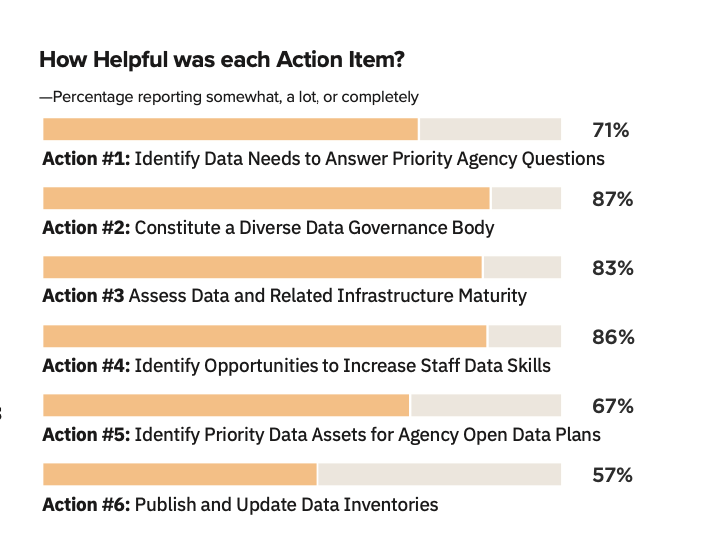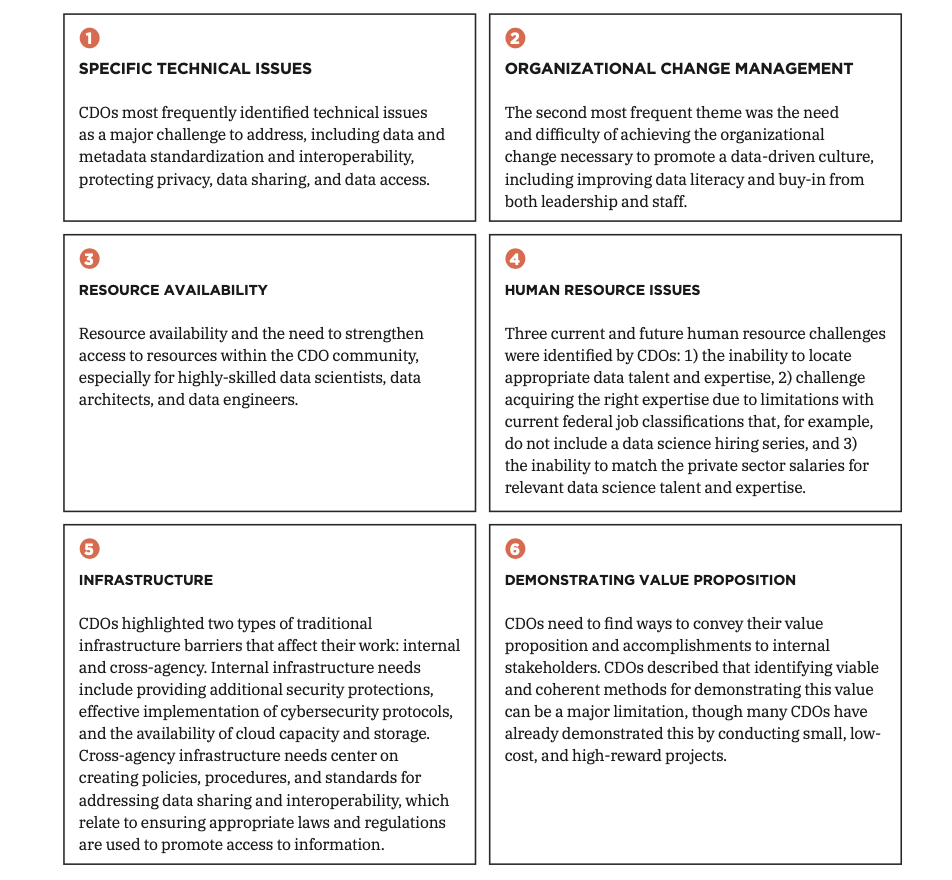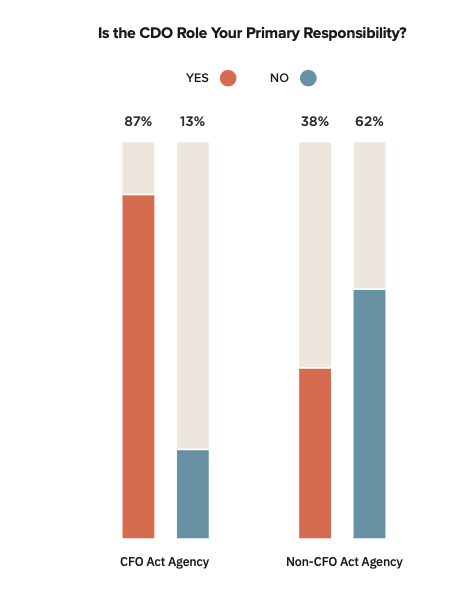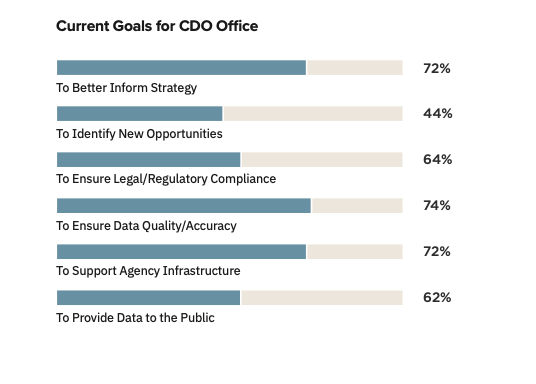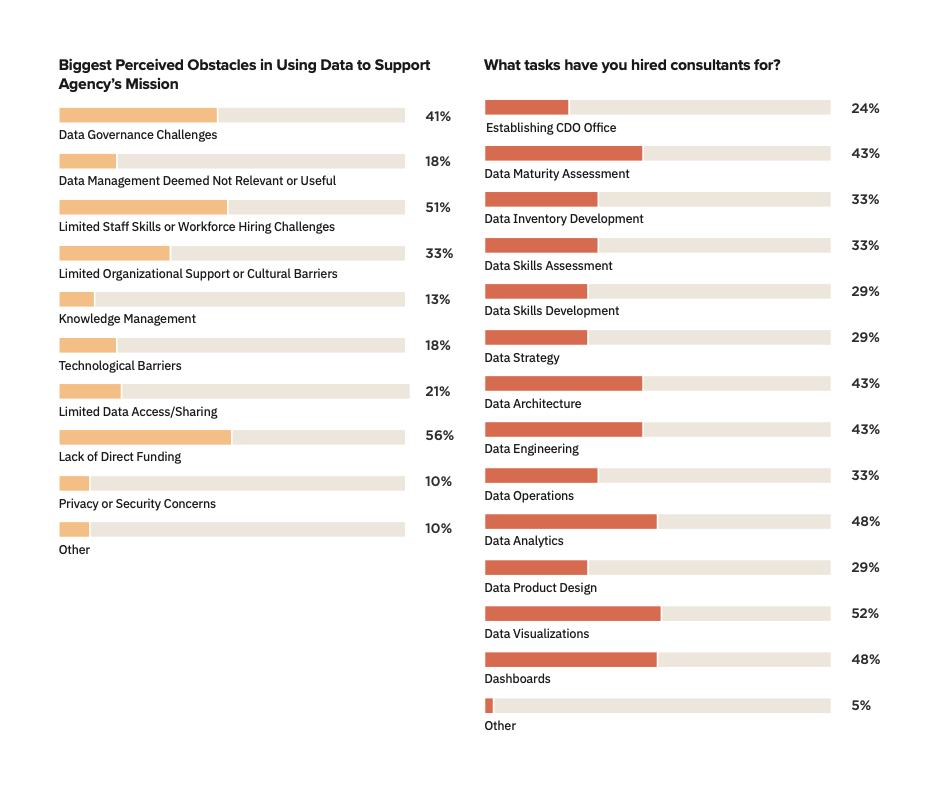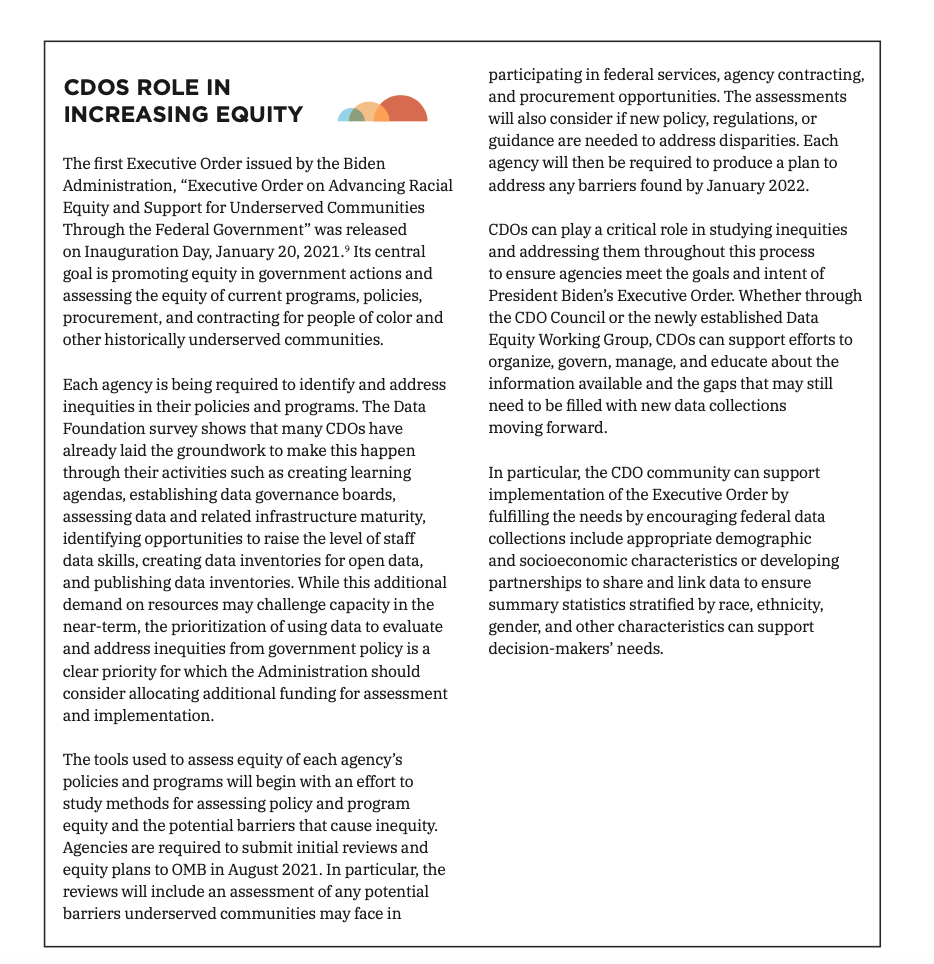Webinar
Watch a webinar discussion on the report’s key findings and recommendations here.
Authors
Executive Summary
More than two years ago, Congress and the President jointly enacted the Foundations for Evidence-Based Policymaking Act of 2018 (Evidence Act). The Evidence • Act directed federal agencies to appoint a Chief Data Officer (CDO) and to take specific actions for improving access to high-quality government data with the goal to enhance decision-making about important programs and the availability of open data for the American people. With the establishment of the CDOs throughout the
federal government, agencies are making meaningful improvements to data infrastructure, governance, and analytics.
The Data Foundation, in partnership with Grant Thornton Public Sector, conducted its second survey of federal CDOs in 2021 to assess the progress of CDOs in fulfilling their responsibilities and supporting their agency missions. Multiple indicators suggest these agency leaders made substantial progress over the past year, including implementing the Evidence Act and the Federal Data Strategy. The Data Foundation combined its survey results with information compiled in 2021 by the CDO Council and from a roundtable with CDOs to provide an extended set of findings and recommendations.
Key Findings
CDOs completed or are making progress on most of the action items in the Federal Data Strategy 2020 Action Plan. Seventy-five percent of responding CDOs reported that they had started or completed implementation of at least 5 of the 6 agency action items that were detailed in the 2020 Action Plan for CDOs.
CDOs are experienced, tenured civil servants. Most CDOs have years of experience in the federal government and at their specific agency, even if their tenure as the designated CDO has been brief. This experience provides CDOs with a wealth of knowledge for understanding how programs operate, navigating management and administrative processes, and for how to most effectively support agency priorities using data assets.
CDOs at smaller agencies are more likely to perform multiple jobs. Nearly two-thirds of CDOs in small agencies had multiple roles in addition to the CDO responsibilities. However, for CDOs in large agencies, only 13% maintained other roles than the CDO.
Just over half of CDOs report hiring contractors to complete tasks. Many CDOs are hiring contractors to perform a wide variety of tasks, suggesting a growing need for rapid and flexibility capacity.
Challenges remain to ensure CDOs are successful long-term. While roles and responsibilities are becoming clearer and better supported, all CDOs continue to face some challenges. Top areas for consideration raised by CDOs include the ability to acquire expertise and talent, identifying resources and funding to support their office, and sustaining leadership support for their activities.
Recommendations
The success of CDOs in the federal government hinges on their ability to perform expected and critical tasks. If they are successful, government data can be an asset and using robust data infrastructure will serve a variety of purposes including improving operational decision-making and evidence-based policymaking capabilities. While there are challenges, their progress is commendable. Based on the survey results, there are several opportunities to support CDOs in their implementation of the Evidence Act and other priorities over the next year:
CDOs can support government in fulfilling virtually every priority and delivering every service to the American people. While there are real challenges for the CDO community, the leaders in the CDO positions across government are realizing tangible, lasting progress for improving the governance and use of data. Congress, leaders in the Executive Branch, and external partners must continue to find ways to support and encourage the maturing CDO community in the years ahead.
Introduction
The evolution of the Chief Data Officer (CDO) role in federal agencies continues to shape data practices and capabilities to support evidence-informed policymaking. For most federal agencies, the CDO role, along with its activities and responsibilities, is relatively new. There are a few federal agencies that have more experience and history than most with the CDO role.
In some of these agencies the CDO and support staff demonstrated the positive impact on operational and programmatic activities.
Like the private sector, the role of the CDO is one that continues to evolve and mature, demonstrating its value and capabilities for improving operations and decision-making. High quality, accessible, and ethically managed data are essential for supporting individuals in making evidence-based decisions. It is necessary to learn the priorities, successes, and challenges of the CDO community to support them and enable their success.
This summary of survey results first provides background on the creation of the CDO role in the federal government, then summarizes findings from recent surveys of the CDO community. The summary concludes with a brief discussion of the implications and recommendations for next steps.
Creating the CDO Role in Federal Agencies
The Foundations for Evidence-Based Policymaking Act (Evidence Act) was passed by Congress in 2018 and signed into law in early 2019. Largely a result of recommendations of the U.S. Commission on Evidence- Based Policymaking, the Evidence Act focused on improving access to government data, improving agencies’ ability to use data, and strengthening data privacy. The CDO role as envisioned by the Evidence Act is to better organize government data to make impactful and informed decisions.
The requirement to establish a CDO is contained in the second title of the Evidence Act, the OPEN Government Data Act. The OPEN Government Data Act lays out the specific qualifications required for CDOs as well as their duties and responsibilities. [1] Qualifications include training and experience in areas such as data collection and data governance that are a direct responsibility of the CDO. Since the qualifications in law are largely skill- and knowledge-based, federal CDOs are not required to have direct experience with their agency or even as a government employee. The OPEN Government Data Act and other portions of the Evidence Act, further define agency expectations in the areas of capacity building, data governance, and data privacy activities.
In 2019, the Executive Branch published a Federal Data Strategy, a ten-year strategy to leverage the use of data
as a strategic asset.[2] The strategy coordinated by the White House Office of Management and Budget (OMB) also provides valuable guidance and priorities to the CDO community.[3] In conjunction with the long-term plan, the Federal Data Strategy 2020 Action Plan included 20 specific action items across three categories to be completed within one year:
AGENCY
Six actions were identified for agencies to implement in order to better manage data in support of the agency’s mission.
COMMUNITY
Four actions were targeted at communities of practice, to be taken through cross-agency collaboration to speed the implementation of already existing requirements. Of note, the establishment of the CDO Council was included as a community action.
SHARED
Ten actions were identified to be implemented by a single agency or existing council, with the intent to produce shared benefits for all agencies.
The establishment of the CDO Council in 2020 marked the beginning of an increasingly coordinated phase for implementing the Evidence Act requirements in the CDO community. The CDO Council now provides additional support, training, and coordination across agencies and priority issues, such as response to the global pandemic using data.[4]
Data Foundation Survey Findings
In 2020, just as many of the CDOs were being named and organizing their operations, the Data Foundation conducted an initial survey of CDOs to identify early stage challenges and opportunities. [5] The Data Foundation’s second survey of federal CDOs was conducted in partnership with Grant Thornton Public Sector, collecting information from federal CDOs in 2021 to determine their progress in implementing their roles and responsibilities. The survey specifically asked CDOs across federal agencies, bureaus, and operating divisions, as well as statistical officials, about their roles both within and beyond the guidance provided by OMB and the Federal Data Strategy. This section summarizes the results of this year’s CDO survey and key findings.
CDOs Bring Substantial Federal and Agency Experience
As with the results from the 2020 Data Foundation CDO survey, the 2021 survey finds that CDOs bring lengthy experience in government service to the role. Of the respondents, all responding CDOs report that they have more than five years of experience in the federal government, up from the 97% reported in the 2020 survey. This suggests CDOs generally have familiarity with the federal government, which should include knowledge of basic laws, regulations, policies, and processes. Almost all CDOs (90%) report having been with their organization for at least a year, and 40% of CDOs report having been with their organization for at least five years.
This level of experience within the federal government and the specific agency served makes sense for such a senior role within federal agencies. Additionally, since the CDO role is relatively new to many agencies, we have seen an increase in the length of tenure for CDOs between 2020 and 2021. In 2020, only 57% had served in the CDO role more than a year and this increased to 80% in 2021. This indicates that CDOs have a relatively deep knowledge of their organization and the data it produces and consumes.
The Most Effective Organizational Structure is Not Yet Clear
There is not yet much evidence as to which reporting structure is most effective for CDOs, though some preliminary perspectives suggest understanding the nuances of the structures will be increasingly important for the success of CDOs.6 In the 2020 CDO survey, the most common direct report for CDOs was to the Chief Information Officer. In 2021, it was to the Chief Executive Officer (30%), the Chief Operating Officer (20%), or the Chief Information Officer (15%). The rest of the responding CDOs report to a variety of agency officials such as the Chief Financial Officer, the Chief Technology Officer, and the Chief of the Office of Performance and Technology. There is not a clear pattern in the survey about why or how agencies choose their reporting structure.
Whatever the structure, 75% of CDOs report that their responsibilities within their organization are either “very” or “completely” clear. For example, almost all mention that their office’s mission promotes and enables evidence-based decision making or the more general mission to drive good data governance. Another sign of the growth of the CDO function is
an increase in the number of personnel assigned to support the role, including as federal employees and contractors. In both 2020 and 2021 about half of the CDOs report having 10 or fewer Full Time Equivalent (FTEs) employees and contractors supporting their office or role, suggesting that most of the offices for CDOs are relatively small in size. However, there are signs of growth in offices that were larger than 10. While the proportion reporting 11-25 FTEs declined from 21%
in 2020 to 10% in 2021, the proportion reporting more than 25 FTEs grew from 25% to 40%. For some agencies, substantial investment and attention to the CDO function means that more personnel were needed, and assigned, to support data governance and analytics activities.
CDOs are Achieving Agency Missions
The majority of responding CDOs (75%) reported that their role within their organization was “very” or “completely” clear. A majority (55%) also responded that they viewed their office as being “very” or “completely” successful in achieving their goals and in supporting the agency mission. Almost all respondents communicated their mission as a CDO with a clear statement focused on data governance, data literacy, and/or the promotion of the use of information for evidence-based policymaking.
The most common functions mentioned as being “very” or “completely” important to achieving their mission are developing or implementing data strategy or governance (100%), facilitating evidence-based decision making (95%), facilitating data sharing (90%), improving data infrastructure such as data cataloging and data architecture (89%), and developing a strong cadre of analyst and data scientist (75%). Less commonly mentioned were contributing to agency’s learning agenda and evaluation plan (35%), which may suggest an area for further collaboration between the CDO and agency Evaluation Officers.
In order for CDOs to be successful in achieving their mission, they must collaborate with other functional areas and officials within and outside their agency. Business customers were mentioned most frequently (90%) as collaborators on a daily or weekly level. Chief Financial Officers (79%), Chief Information Officers (70%), and officials in other organizations (63%) were the next most frequently mentioned collaboration points on a daily or weekly basis.
CDOs are Making Progress on the Federal Data Strategy 2020 Action Plan
The Federal Data Strategy 2020 Action Plan contained 20 actions to be addressed within a year, including six to be completed by each agency. Based on the survey results, at least three-quarters of respondents reported that some agency-level action items were in progress or fully implemented. Constituting a diverse data governance body was by far the most commonly implemented item with 75% of respondents reporting that agency action had been completed. The other action steps were reported to be complete by 25%-35% of the survey respondents. None of the responding CDOs reported completing all six action items, but 75% reported having at least five of the items “in progress” or “completed.”
Constituting a data governance board was also reported as the least challenging agency action with 42% of respondents stating that doing so was “not at all challenging” or “a little challenging.” This may reflect the fact that the requirement to establish the board included few other specifications about buy-in, frequency of meetings, composition, or other characteristics that might measure the degree to which the data governance boards achieve their purpose. CDOs who completed an agency action from the Federal Data Strategy were also asked how helpful completing that item was. The establishment of a data governance board was viewed as “completely” helpful by half of those CDOs who completed the action.
A common theme in communications with CDOs is their desire for additional guidance in implementing the Federal Data Strategy 2020 Action Plan. During a June 2021 CDO roundtable discussion, CDOs explained that guidance primarily comes from the Federal Data Strategy, the CDO Council, and peer-to-peer discussions and coaching. While the 2020 plan provided specific activities and timeframes, the CDOs expressed interest in having further guidance and potentially support or resources (e.g., templates and resources) to complete future agency actions. Yet the CDOs consistently suggest the Federal Data Strategy was a valuable resource for organizing their work and priorities.
Highlights of CDO Successes
Respondents were asked to describe their successes in the role as a CDO. A few agencies reported that
their main successes included basic organizational change structures such as hiring a CDO or establishing an agency-wide governance community to set the foundation for creating a data-driven culture. Several others reported on more specific data governance actions, such as actions focused on setting policies
for data sharing, setting data standards, creating a data warehouse, and/or creating an agency-wide analytics platform.
Other organizations shared their successes that included providing real-time data for their agency through the creation of data dashboards and other data visualizations. The data sharing and availability to real- time information provided by the CDO enabled decision- makers in their agencies to respond to decisions that needed to be made using the data at hand.
CDOs Continue to Face Challenges
The individuals perhaps best suited to identify and express the challenges faced by the CDO community and individual positions are the CDOs themselves. In the survey, the responding CDOs acknowledged that multiple barriers and challenges exist that affect their progress and success. Overall, the CDOs would benefit from additional resources, as 50% of CDOs said they “somewhat” have the resources needed to succeed on their goals. Yet only 35% of CDOs felt they had “a lot” or “completely” enough resources. Taken together, this suggests that many CDOs are under-resourced to succeed in the federal government today. CDOs stressed four key types of support and resources needed:
Staffing size and expertise. The need for more staff was the top request articulated by CDOs. However, CDOs did not just request FTEs, but rather to add specific highly-skilled data scientists, data architects, and data engineers required to successfully carry out data governance and management activities. One cross-agency effort that was viewed positively by participants in our roundtable overall was the January 2021 joint hiring initiative coordinated by the Office of Personnel Management (OPM). Ten agencies joined together to put out the call to hire 50 senior data scientists.
Funding for improved technical capabilities and infrastructure. CDOs expressed the need for financial support for various forms of non-labor infrastructure, including updated hardware and software. They also identified a need for additional resources to support training in data literacy, which is one key element of building capacity to generate and use data for decision-making.
Clearer and broader guidance. CDOs requested improved guidance, both from within their agency and from federal leadership, such as OMB. Within their own agencies, CDOs were looking for agency leadership to weigh in on and support data strategy initiatives, such as data standards, privacy protection, and data policy development. Outside their agency they were looking for more support in terms of OMB’s next annual action plan for the Federal Data Strategy to help provide a clearer path for their maturity. CDOs specifically requested clearer guidance on actions in the Federal Data Strategy, even though the timelines had passed for key deliverables. They also requested clarity on the reporting requirements from OMB on the Federal Data Strategy.
Examples of Success Stories. Given the early-stage maturity for many CDOs, identifying examples of successes that can be emulated was another request identified in the survey. Use cases and success stories can provide lessons from peers, and also offer opportunities to improve how agencies communicate about data practices with senior leaders and potential allies in program offices looking for examples about how data can improve processes and operational decision-making.
The results of the 2021 Data Foundation CDO survey are consistent with many of the findings in the survey we conducted in 2020, one year earlier. Both surveys overlap in terms of roles and responsibilities, characteristics of the CDOs and their officers, and perceived key resources and challenges. Additionally, the 2021 CDO Survey allowed us to gather information on the CDOs’ progress on implementing the Federal Data Strategy and action items intended to be completed in 2020. Most CDOs reported making considerable progress on these actions, with some stating that it was helpful to have defined tasks and deadlines.
Challenges for the CDO Community
When asked about specific challenges they saw facing the respondents pointed out six main challenges or the federal CDO community as a whole moving forward, potential barriers to CDO success:
Findings from CDO Council Survey of Members
The CDO Council conducted a survey of its recognized members in early 2021, releasing the findings and survey data on May 31, 2021.7 While some portions of the survey overlapped with this year’s Data Foundation survey, there was additional information to explore in learning about the current status and future opportunities for the federal CDO community. There were also some differences in the survey population. The CDO Council limited its survey to its members who are the top-level CDOs in federal agencies, while the Data Foundation survey sample frame included top-level, bureau, and operating division CDOs.
Characteristics, Roles, and Responsibilities of CDO Council Members
Of the respondents to the CDO Council survey, 38% represent large agencies and 62% represent smaller agencies.[8] Of those, a much higher proportion of CFO Act agency CDOs reported that being CDO is their primary role (87%) than did the non-CFO Act agency CDOs (38%).
The success of any CDO relies on the presence and support of other senior officials in the agency or organization. Most small agencies have a designated Chief Information Officer (92%), Chief Information Security Officer (92%), Senior Agency Official for Privacy (88%), and Senior Agency Official for Records Management (71%). Only a few have named an Evaluation Officer (21%) or Statistical Officer (4%), and they are not explicitly required to by the Evidence Act. This indicates that priority in small agencies is largely given to the technical roles involved in data infrastructure, governance and privacy over the more analytic roles required to apply evidence in these agencies.
The CDO Council survey asked respondents about the CDO roles and responsibilities by providing a list of 22 different responsibilities and asked the respondents to note their level of responsibility for each. Of those responsibilities, CDOs most frequently responded that they held “Manager Responsibility” or “Primary Accountable Official” responsibility in “Data Governance” (95%), “Data Strategy (89%), “Open Data” (87%), and “Data Evangelism” (81%).
In line with the Data Foundation survey, the CDO Council survey found that the most common reporting structures for CDOs were to their Chief Executive Officer or Chief Operating Officer, with the next largest group reporting to the CIO. Twenty-six percent report having sub- component CDOs in their agency, half of whom report to the sub-component’s Chief Executive Officer or Chief Operating Officer. This indicates that the majority of responding CDOs are reporting to senior-most leaders in their organizations.
The size of CDO offices in both surveys are somewhat similar. In the CDO Council survey, 68% report having 10 or fewer FTEs supporting their office as compared to 60% in the Data Foundation survey. Fourteen percent report having 11-25 FTEs (30% in the Data Foundation survey) and 19% report having more than 25 FTEs (10% in the Data Foundation survey).
When it comes to the need to hire additional talent and workforce, some CDOs are recruiting to fill vacancies. Thirty-one percent report having five or fewer unfilled positions and 14% report having 5-10 unfilled positions. Most (54%) CDOs in the CDO Council survey, however, report having zero unfilled positions.
CDOs also have widespread use of contractors to support operational needs. Just over half (54%) report hiring consultants to perform certain technical tasks. A much higher proportion of CDOs at large agencies (73%) report hiring contractors than smaller agencies (42%).
The most common areas for contractors were data visualizations (52%), dashboards (48%), data analytics (48%), and data maturity assessments (43%). The use of contractors is indicative of a need to rapidly fill expertise and knowledge needs with flexible capacity and talent.
Identifying Obstacles and the Road to Success for CDO Council Members
As in the Data Foundation survey, the CDO Council asked its members about their greatest challenges. The CDO Council survey provided a list of potential obstacles and asked CDOs to select all that apply. The most frequently mentioned obstacles were “Lack of Direct Funding” (54%), “Limited Staff Skills or Workforce Hiring Challenges” (51%), and “Data Governance Challenges” (41%).
The limits on direct funding include an acknowledgment that many CDOs do not have funding flexibility to engage in the amount of long-term planning necessary for success. For example, many projects that CDOs need to engage in will be multi-year efforts and require predictability about funding and resources over multiple years.
According to CDOs, there are sizeable challenges with staffing and hiring to fit the skills needed for CDOs. Currently, CDOs are blending together existing hiring authorities and occupational series for ancillary positions under current law. Many CDOs identified this as a substantial limitation in the absence of better fitting hiring and staffing authorities.
Data governance challenges cover a wide range of difficulties from human resources to technological challenges. For some of the CDOs who were interviewed separately, a major challenge to data governance mentioned is ensuring data quality, consistent with expectations about fitness for use as well as requirements in the Information Quality Act. In many cases, individuals and personnel collecting administrative records are inputting data as a secondary or tertiary responsibility and may create susceptibilities to inadvertent errors or gaps in quality.
While all senior leaders in government face challenges, CDOs express a positive outlook in the CDO Council survey about fulfilling key goals in their road to success. The CDO Council provided members a list of potential goals to rate. The most frequently mentioned goals reported were “To Ensure Data Quality/Accuracy” (74%), “To Support Agency Data Infrastructure” (72%), and “To Better Inform Strategic Priorities” (72%). All three of these goals tie into the larger purpose of the Evidence Act of improving the use of agency information in evidence- based policymaking.
These results indicate that the CDOs recognize that providing quality data on a timely basis is central to their role in supporting the evidence based decision-making called for by the Evidence Act. The results also suggest that CDOs perceive that they are not adequately resourced to provide needed support to their agencies and that CDOs need help identifying concrete steps to take in fulfilling their roles while ensuring buy-in from across their organizations.
Key Federal CDO Insights in 2021
This second Data Foundation CDO survey and the CDO Council survey in 2021 offer some key observations about the role, challenges, and successes of the federal CDO community. They, along with the conversation with a selection of CDOs, present an opportunity to provide recommendations to strengthen the support for the ongoing efforts of the community and its members. Some key findings and insights include:
CDOs completed or are making progress on most of the action items detailed in the Federal Data Strategy 2020 Action Plan. Seventy-five percent of responding CDOs reported that they had started or completed implementation of at least 5 of the 6 Agency Action Items that were detailed in the 2020 Action Plan for CDOs.
CDOs are experienced, tenured civil servants.
Most CDOs have years of experience in the federal government and at their specific agency, even if their tenure as the designated CDO has been brief. This experience provides CDOs with a wealth of knowledge for understanding how programs operate, navigating management and administrative processes for how to most effectively support agency priorities using data assets.CDOs at smaller agencies are more likely to perform multiple jobs. Nearly two-thirds of CDOs in small agencies had multiple roles in addition to the CDO responsibilities. However, for CDOs in large agencies, only 13% maintained other roles than the CDO.
Just over half of CDOs report hiring contractors to complete tasks. Many CDOs are hiring contractors to perform a wide variety of tasks, suggesting a growing need for rapid and flexibility capacity. Common tasks for contractors included developing data visualizations, dashboards, data analytics, and data maturity assessments. A much higher proportion of CDOs at large agencies (73%) report hiring contractors than smaller agencies (42%) which may also be a reflection of budget and resource capabilities.
Challenges remain to ensure CDOs are successful long-term. While roles and responsibilities are becoming clearer and better supported, all CDOs continue to face some challenges. Top areas for consideration raised by CDOs include the ability to acquire expertise and talent, identifying resources and funding to support their office, and sustaining leadership support for their activities. CDOs recognized both the need for additional guidance from OMB and the need for talent with specific data capabilities (e.g., data analytics, statistics, artificial intelligence, etc.).
CDOs are collaborating across agency silos using data governance boards. After data governance boards were formed, CDOs began implementing specific activities in collaboration with the board to make progress on actions in the Federal Data Strategy and specific agency priorities.
Recommendations and Next Steps
The success of CDOs in the federal government hinges on their ability to perform expected and critical tasks.
If they are successful, government data can be an asset and using robust data infrastructure will serve a variety of purposes including improving operational decision- making and evidence-based policymaking capabilities. While there are challenges, the progress of CDOs in tackling the many tasks and responsibilities over the past year is commendable. Survey results suggest several opportunities to support CDOs in their implementation of the Evidence Act over the next year. Below are recommended actions to help realize the opportunities within and across agencies:
Recommendation 1 – Congress should increase CDO funding flexibilities and direct resources.
Most CDOs do not have adequate resources to fulfill their statutory responsibilities and support agency missions. CDOs need sustained, predictable, and adequate resources to implement data priorities. Congress should authorize CDOs to use additional funding flexibilities and set-aside authorities, as well as provide increased direct appropriations for CDOs to succeed. This longer-term resourcing plan aligns with the congressional intent in establishing the CDO role through the Evidence Act, which created the position indefinitely rather than for a short-term period. OMB should also include such requests in the FY 2023 President’s Budget request to Congress.Recommendation 2 – OMB should issue additional guidance to CDOs to clarify responsibilities and expectations. Clarifying guidance is needed to better articulate the data governance function in government, CDO responsibilities for open data and tiered access, and how agencies should recognize the role of the CDO among senior leaders. While CDOs are operating with their peer community of practice and under the general framework of the Evidence Act and the Federal Data Strategy, additional guidance from OMB can help align emerging priorities from the administration with the activities implemented by CDOs. In the short term, an updated Federal Data Strategy Annual Action Plan could address many
of these gaps. In addition, CDOs would be helped by clearer expectations around their reporting requirements, for example, in how to address required due dates and expectations about what they should be reporting to OMB, Congress, and the American people. Additional guidance could also include more tactical direction about what steps CDOs should take, with what priority, and areas for interagency cooperation and collaboration. CDOs may also benefit from additional legislation that would more clearly lay out definitions and specific steps to be taken, or address challenges implementing current legal responsibilities.Recommendation 3 – Congress should remove the statutory sunset of the CDO Council. Currently the CDO Council is scheduled by law to sunset in 2025. It has proven itself to be a valuable coordinating body and community of practice for CDOs. The CDOC provides vital technical assistance and a valuable community of practice to convene and share knowledge. Since most CDOs and their offices are relatively new to the role and responsibilities, additional support from the CDO Council and peers in the form of technical assistance, resources for strategic planning, and other planning processes can support the entire CDO community, including for CDOs operating with limited staff and capacity. With the expectation that CDO roles continue indefinitely, the coordination of the CDO Council should as well.
Recommendation 4 – CDOs can improve communication about how they demonstrate the value of using data. Where possible, in coordination with the Chief Evaluation Officer and the Chief Statistical Officer, CDOs should engage in deliberate steps to provide metrics, summaries, and, when possible, evaluations that highlight the impact and cost savings of their efforts. To gain support within their organizations, CDOs need to show their leadership strategically, including valuable accomplishments that improve the ability for other staff to better perform the roles. In so doing, CDOs may help build a more compelling case about the need for resources to create and grow the staff and gain leadership buy-in within their agency. If the CDO is able to show programmatic savings in time and/ or dollars caused by their activities, they establish a base for justifying the use of existing resources and requesting greater resources in the future. Even small wins are vital to building support. CDOs also benefit in helping to manage organizational change, encourage data literacy, and increase the influence of evidence- based decision making.
Information collected from CDOs across the two surveys and a small roundtable provides a great deal
of information about the current status of CDOs. As the offices gain experience, they report significant progress in reaching the overall goals of providing data to both the public and their agencies to inform evidence-based decision making. While the CDOs do report certain challenges to future progress, they are not insurmountable challenges. The information that was collected in the Data Foundation survey has also allowed us to provide specific recommendations to address these challenges that should lead to continued success for the CDOs.
CDOs can support government in fulfilling virtually every priority and delivering every service to the American people. While there are real challenges for the nascent CDO community, the leaders in the CDO positions across government are realizing tangible, lasting progress for improving the governance and use of data. Congress, leaders in the Executive Branch, and external partners must continue to find ways to support and encourage the maturing CDO community in the years ahead.
Appendix and Survey Methods
This report reflects the results of the Data Foundation’s second government-wide survey of federal CDOs and the CDO Council’s first survey of its members.
The Data Foundation compiled an inventory of all known federal chief data officers, including those recognized
on federal agency websites, through social media,
news reports, and Leadership Connect, a directory of federal employees. Additional insights and research conducted by report authors and Data Foundation staff supplemented the survey findings. The Data Foundation invited CDOs and designated statistical officials to participate by email, to complete a web-based survey in February and March 2021. Data Foundation re-invited CDOs by email three times to those non-responding. Following the fourth invitation, Data Foundation staff contacted CDOs by phone for final non-response follow- up. The response rate for the survey was 16%.
Following the field period for the survey, the Data Foundation invited a sub-sample of CDOs, who consented for recontact, to participate in a virtual roundtable. This discussion provided additional context on issues around staffing, other barriers and challenges, their reaction to the Federal Data Strategy 2020 Action Plan, their thoughts on the upcoming 2021 Action Plan, and organizational change management in their agencies.
The sample for the CDO Council survey was its membership which consists of approximately 80 CDOs at the top-level of their agency. With a total of 39 responses, their completion rate was 49%.
Endnotes
Data Foundation. Future of Open Data: Maximizing the Impact of the OPEN Government Data Act. Washington, D.C.: Data Foundation, 2019. Available at: https://www.datafoundation.org/future-of-open-data-maximizing-the- impact-of-the-open-government-data-act.
Office of Management and Budget (OMB). Federal Data Strategy – A Framework for Consistency (M-19-18). Washington, D.C.: White House Office of Management and Budget, 2019. Available at: https://www.whitehouse. gov/wp-content/uploads/2019/06/M-19-18.pdf.
For the updated Federal Data Strategy, see https://strategy.data.gov/.
See additional details about the CDO Council at www.cdo.gov.
Data Foundation. Effective Data Governance: A Survey of Federal Chief Data Officers. Washington, D.C.: Data Foundation, 2020. Available at: https://www.datafoundation.org/effective-data-governance-a-survey-of-federal- chief-data-officers-2020.
Rowley, K. and N. Hart. Structure the Chief Data Officer for Success: Identifying Appropriate Organizational Placement and Structures for a Federal CDO. Washington, D.C.: Data Foundation, 2021. Available at: https://www. datafoundation.org/structuring-the-chief-data-office-for-success.
Findings and results can be found at: CDO Council. CDO Council Survey and Results. Washington, D.C.: General Services Administration, 2021. Available at: https://www.cdo.gov/news/cdoc-survey-and-results/.
Note that large agencies” refers to the 24 federal agencies and departments designated in the Chief Financial Officers (CFO) Act, often referred to as “CFO-Act agencies” while the term “small agencies” includes the non-CFO Act agencies. All federal agencies are required to have a CDO designed, regardless of whether the agency is listed in the CFO Act or not.
Biden, J. Executive Order on Advancing Racial Equity and Support for Underserved Communities Through the Federal Government. Washington, D.C.: The White House, 2021. Available at: https://www.whitehouse.gov/ briefing-room/presidential-actions/2021/01/20/executive-order-advancing-racial-equity-and-support-for- underserved-communities-through-the-federal-government/.
Disclaimer
This paper is a product of the Data Foundation, sponsored by Grant Thornton Public Sector . The findings and conclusions expressed by the authors do not necessarily reflect the views or opinions of the Data Foundation, its funders and sponsors, or its board of directors.


